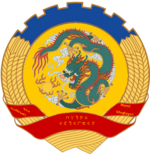Qinglonghui
| Qinglonghui ㄑㄧㄥㄌㄨㄥㄏㄨㄟ Qīng Lóng Huì | |
|---|---|
 | |
| Chairperson | Li Pingbo |
| Founded | 12th December 1911 |
| Headquarters | Lingxia |
| Youth wing | Youth Freedom League |
| Membership (2015) | 2,500 |
| Ideology |
Manchurian nationalism Neo-derzhavism Anti-communism Anti-Landonism Anti-immigration Rigth-wing populism |
| Political position | Far right |
| Official colours | Blue, red and yellow |
| Seats in the Zuigaohuiyi |
26 / 685 |
| Local Government Seats |
45 / 1,110 |
|
Politics of Manchuria Political parties Elections | |
The Azure Dragon Society (Chinese: 青龍社会; ㄑㄧㄥㄌㄨㄥㄏㄨㄟ; Qīng Lóng Huì) colloquially known as the Qinglonghui is a far right political party in Manchuria. It is the second smallest party in the Zuigaohuiyi in Manchuria, although it is also the oldest party in Manchuria.
The party was founded in December 1911 by Qing loyalists during the Xinhai Revolution, with its intentions being the survival of the Qing dynasty. They continued this loyalism until the creation of the First Manchu Republic where they supported the government of Zhao Guangping, with many supporting the idea of crowing Zhao as a Emperor of Manchuria. Following the Japanese Invasion of Manchuria the group switched back to supporting Puyi - however they subsequently opposed the Japanese and helped lead the Manchu Revolution.
Following the Soviet Invasion and creation of the Democratic People's Republic of Manchuria the Qinglonghui was a significant opposition force to the communist government, relocating to Korea where it fought in the first and second Manchu-Korean wars. The Manchurian government accused the organisation of committing terrorist acts during the 1950-60's. Following the Orchid Revolution the Qinglonghui has rebranded itself as a nationalist, conservative party. Critics accuse it of being neo-fascist, a connotation the group denies.
The Qinglonghui officially identifies with nationalist politics, and heavily opposes pratices associated with so-called cultural Marxism instead advocating for the celebration of traditional Manchurian culture and Asian values. The party also is advocates for a corporatist economy, identifying itself as Third Position. The Qinglonghui is also famous for its fervent anti-communism and general opposition to itself social liberalism being staunchly conservative. The party has been accused of racism towards migrants despite the party's insistence that it is simply "anti-open immigration". Nevertheless the Qinglonghui maintain a strong following among older citizens as well as the young, unemployed working class due to their anti-immigration stance.
History
Ideology
Organisation
Election results
Political Positions
Economic
- Promote the hiring of native Manchurians for jobs instead of immigrants.
- Encourage a balance of regulations in the economy so productivity serves the Manchu state, not transnational corporations.
- Pull back all state subsidises in tertiary education, thereby allowing only the very best into higher education.
- Increase employment.
- Cut back on healthcare and abolish welfare as it currently stands.
Social
- Ban all sex education and promote large families.
- Oppose all moves to legalise homosexuality.
- Promote Manchurian nationalism and Asian values.
- Ban all drugs.
- Make it illegal to obtain a divorce and to remarry.
- Ban all abortions for all reasons.
- Reinstate the death penalty.
- End universal suffrage.
- Ban and Censor all foreign social media such and YouTube, Facebook, Instagram, and Twitter
and completely disconnect from the global internet.
- Shutting down family planning clinics.
- Ban the use of Chinese.
- Rehaul the educational curriculum and the teaching establishment in general, so to cleanse the influence of Cultural Marxism in education.
- Ban all foreign culture publications.
- Expand the powers of the police forces, allowing them to detain, question, and execute persons without a warrent to limit terrorism.
Foreign
- Remove Manchuria out of all international organisations.
- Create Greater Manchuria, which would include territory lost in the Tianjin Agreement and Outer Manchuria.
- Deport all first generation immigrants.
- Enforce tougher immigration laws and limit immigration to at most 40,000 people a year.
- Renew a revised version of the Soviet-Manchurian Dissident Act 1954 with Russia and maintain the Chinese-Manchurian Dissident Act 1966.
- Cut the foreign aid budget from 0.7% to 0.2% of the national GDP.
